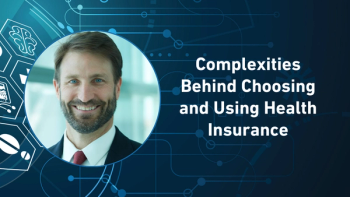
- Pharmaceutical Commerce - March/April 2015
A conversation with W. Scott Evangelista, Quintiles
In a manner of speaking, Quintiles Transnational Holdings, Inc. (Durham, NC) is the pharma industry in a microcosm: pursuing basic and applied research, Phase I-IV; working with healthcare providers and patient associations to understand population health; and handling most aspects of bringing drugs to market, including: contract sales, scientific communications, patient education, market access and channel management; all with consulting services layered over these operational objectives. The only missing component is actual manufacturing—but then many pharma companies outsource that themselves. “Microcosm” belies the company’s size: more than 32,000 employees in approximately 100 countries, and with 2013 revenues of $5.1 billion, it cracked the Fortune 500 list (at No. 486) for the first time last year.
The bulk of Quintiles is involved in clinical research, where it is the world’s largest dedicated service provider. But more than a quarter of the company (based on revenue contribution) is organized under the Integrated Healthcare Services (IHS), which brings together the sales, patient and market support activities. W. Scott Evangelista, president of Integrated Commercial Services and Solutions, the largest business unit within IHS, sat down to talk with Pharmaceutical Commerce. Here’s what he had to say.
1. 
You joined Quintiles about 16 months ago. Where were you previously, and what led you to Quintiles?
A good part of my career was at Swiftwater Group (now part of YES Group), which I helped found in 1998. At the time, the company had both clinical and commercial services for life sciences companies. In 2006, I brought my commercial services team to Deloitte, where I was a partner prior to joining Quintiles. Looking back, it’s fair to say that 25+ years of my career has been dedicated to consulting and advisory services in the life sciences industry—helping companies develop and commercialize their products.
Quintiles is a tremendous organization—doubly so because it serves the life sciences industry. Throughout Quintiles and the pharma companies I’ve worked with, there are great people motivated to make a difference in the world by bringing new treatments to patients who need them. I think there is an opportunity to help communicate this value to the marketplace; the industry hasn’t always done this in the past, but as the healthcare landscape evolves, it is becoming increasingly more important to do so.
What I saw at Quintiles when I left Deloitte was getting another step closer to actual product commercialization. At management consulting firms, you provide your advice and then stand back and watch the client execute. At Quintiles, we’re at the front line in executing what the client wants, both in clinical research and in commercialization.


2. Most people think of Quintiles as a CRO; what does Integrated Healthcare Services do that’s separate from that?
The origins of IHS go back, mostly, to an acquisition of a contract sales organization, Innovex, that Quintiles made in 1996. Over the years, as more market-oriented services arose in the organization, such as patient education or medical affairs, the range of services Quintiles offered became broader, and the decision was made to bring it all together under the IHS banner. Most recently, that has extended to provider services—helping hospitals and healthcare systems implement and leverage the information systems to improve performance, quality and patient outcomes.
Today, our range of services is quite broad, all oriented around providing solutions based on solid analytics to achieve the best outcomes:
- 
Commercial Services, including contract sales, market entry/exit, integrated channel management, patient engagement, market access and commercialization consulting;
- Communications & Engagement Services, including digital patient services, brand and scientific communications;
- Real-World and Late Phase Research, including observational studies, product and disease registries, and comparative effectiveness studies;
- 
and the acquisition we made a year ago, the healthcare analytics firm now called Encore, A Quintiles Company.
There’s logic to all this: years ago, a client might have come to us saying “I need 100 field reps to launch my product.” Today, it’s not just about the quantity of reps. The decision starts with collecting the right data for market access, patient support, medical affairs and other factors, and then understanding how these play out in global markets. We now have the experience of hundreds of projects in which we have helped commercialize products around the world to base our evaluations. Think of it as building a house: the pharma company can line up all the outsourced services themselves, or can hire us as the general contractor to achieve an integrated commercialization approach without dropping the ball and adding costs to manage from one handoff to another.
3. 
You mention global commercialization issues—which has been a dominant theme of the biopharma industry for the past several years. How does Quintiles approach a global product launch for its clients?
Most organizations carry globalization as a competency internally by market or country. What we bring to this is an unparalleled breadth across countries and across therapy areas. In some countries, for some pharma companies, we are their exclusive commercial presence—we do the regulatory studies, build and operate the business infrastructure, and carry out the commercial activities, in part through our contract sales resource of more than 6,500 reps. But this process begins with analyzing the insights from our experience of past commercialization efforts. Where a company first launches their product makes a difference: commercial practices in Japan, for example, differ greatly from those in European countries or in emerging markets, so we tailor our recommendations for each project.

4. How does IHS work with other parts of Quintiles, such as Consulting or Clinical Research, to provide a consistent level of service to its clients?
You know, it’s interesting, if you look at large pharma companies over the past 25 years, business models, organizational structures and dynamics have shifted. While we continue to see improved collaboration within companies, there are still examples where R&D does its “thing” alone, developing products that may or may not have commercial success. Some companies are addressing this successfully by providing incentives for the R&D personnel to participate in a product’s commercial success—that creates a mandate for the clinical people to talk to the commercial people.
With our clinical research business, we have an opportunity to bring commercial insight into the process. One recent example started as a simple toxicology study for a product under development. Early on, the realization occurred that the product had a lower side-effects profile than competing products in the marketplace, which meant that it could be administered for a longer period of time with a greater chance of therapeutic benefit. But to wind up with a product label that allowed for that potential commercial benefit, the study needed to be run longer than its original duration. Ultimately, that finding resulted in a better development plan that led to a more competitive label that contributed to the product’s commercial success.
The ability to bring that commercial insight into the product development process, from Phase I through launch, is a critical value that Quintiles offers.


5. ‘Big Data’ and analytics are a recurring theme in drug development and commercialization, and you’ve alluded to the data resources of Quintiles before. How is Quintiles addressing this trend?
Deriving value from Big Data requires, first, to have access to that volume of data, and then to be able to do something meaningful with it. Ultimately, the goals here are to develop better clinical trial designs—which we have a lot of expertise in—and to configure those trials so that they produce useful outcomes data or real-world evidence. We also have the resources, based on our clinical trial expertise, to run simulations of trials and use those to improve study designs.
The investment that has been made nationally in electronic health-record systems (EHRs) is starting to produce the data that will support real-world evidence studies, but there is a long way to go. The current industry friction over hepatitis C therapies (which I’m not close to) are a good example. Manufacturers stress the high cure rate of the drug, but some payers and health system pharmacy and therapeutics teams don’t have a good way of capturing the savings of curing a chronic condition. The pharmacy director says, “I’m in charge of the pharmacy budget,” and looks for cost reductions in drugs, rather than an improvement in the quality of care and patient outcomes.
Our market access work runs the gamut from pre-launch to understanding how products flow through the health system. Ideally, on launch day, there is an understanding of the healthcare environment, and analytics to support a data strategy that was folded into the Phase III and IV studies, and develop real-world evidence that create decisions on how products are best used.


6. Another part of IHS is patient engagement and digital services. What needs of the pharma industry is Quintiles supporting through that?
The heart of Patient Engagement and Digital Services is our proprietary community of more than 3.5 million patients who have opted in to be re-contacted for opportunities to improve their health and the health of others like them. We are not talking about a patient database or a little social network, we are talking about patients with whom we have a consented two-way relationship, and are actively seeking solutions. We combine these relationships with our expertise in digital development, creative design and medical acumen to build highly interactive experiences for patients and healthcare professionals to participate in clinical research, observational studies and disease management programs.


7. What do you see for the near-term future of commercialization in pharma?
Market access as it relates to accountable care organizations (ACOs) looms large. We’ve already had significant experience in this environment through our work in the UK, where, although there is a National Health Service, regional commissioning groups have a lot of influence on what therapies are provided. It’s not a lot different, but the pattern is that each payer has its own profile, and the commercial team needs to be armed with health outcomes data and real-world evidence to support a therapy that makes sense to a local payer/provider in the context of their population. Sales reps and market access teams need to have a strong medical background to address cost, therapeutic advantage, side effects and the tradeoffs among these meaningfully.
It’s interesting to note, in this context, the importance of medical affairs and medical science liaisons (MSLs). We’ve done a fair bit of hiring in that area, and we find that medical affairs and MSLs working for us have a better career path because of the breadth of products we work with. At a pharma company, it’s difficult to go beyond one drug or one therapy class as one of these professionals.


8. What keeps you going personally in your work?
I’ve had a management consulting perspective for most of my career and, as I’ve noted, the trend for me has been getting closer and closer to the front-line work of life sciences, which I find tremendously satisfying. I think the greatest single challenge to the pharma industry is, simply, inertia—the resistance to change. There are new issues to deal with and new ways of doing things, and I want to be able to bring that to our clients for the benefit of patients.
Two of my proudest and most memorable projects were directly related to helping pharmaceutical companies get important therapies to patients whose lives were threatened. We had to break all conventional wisdom and work with regulators and providers, but we did it and it mattered. In the end, that is what it’s all about for me.
Articles in this issue
almost 11 years ago
Politics and drugsalmost 11 years ago
Manufacturers: Get ready for global trade account managementalmost 11 years ago
Partnering to diversify yields rapid growthalmost 11 years ago
Campbell Alliance updates, expands its commercial launch consulting servicesalmost 11 years ago
HealthPrize touts its success with 'gamification' in adherence programsalmost 11 years ago
Exostar grows its network of collaborative tools in life sciencesalmost 11 years ago
Rite Aid to buy EnvisionRx, continuing a reshaping of US drug distributionalmost 11 years ago
Preventing and Managing Drug Shortages--PDA Technical Report 68Newsletter
Stay ahead in the life sciences industry with Pharmaceutical Commerce, the latest news, trends, and strategies in drug distribution, commercialization, and market access.



